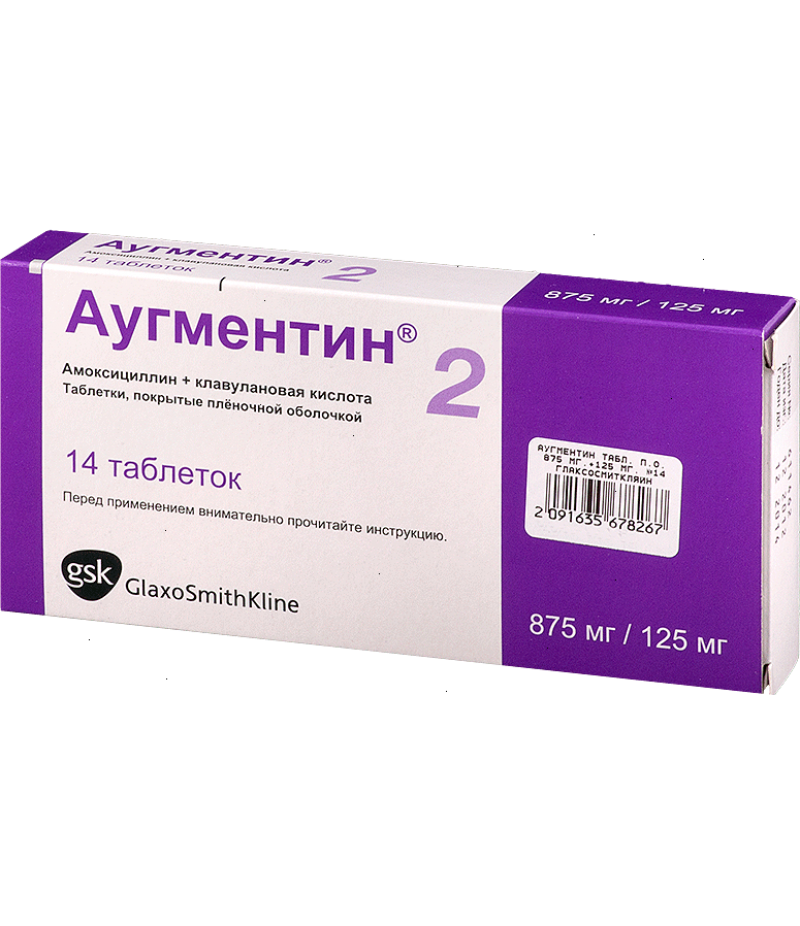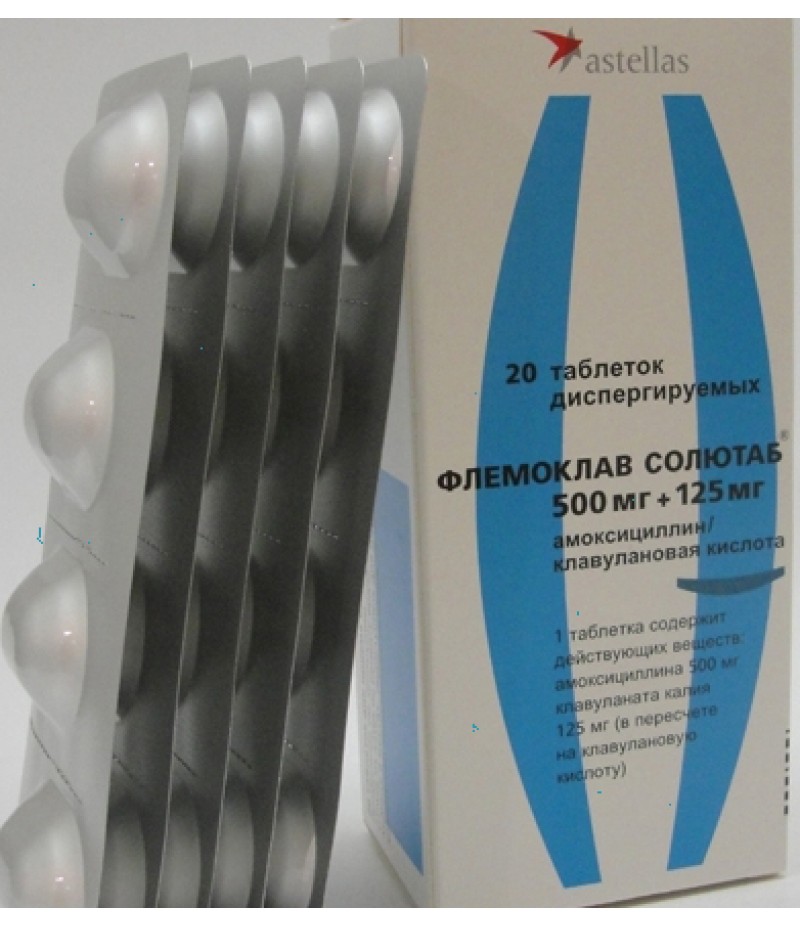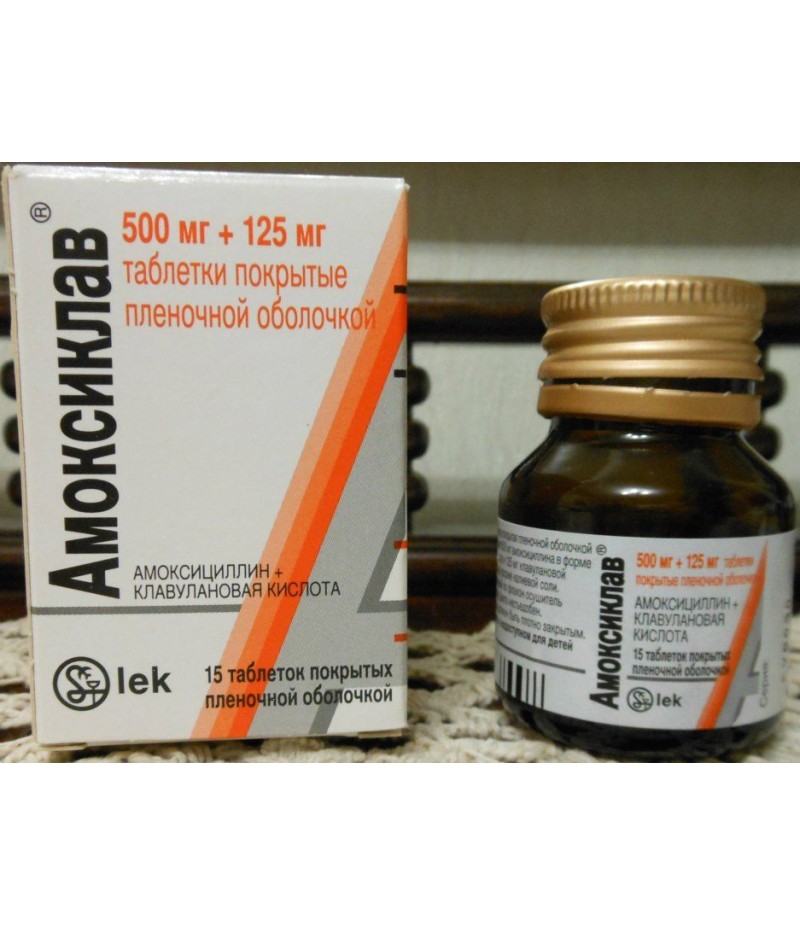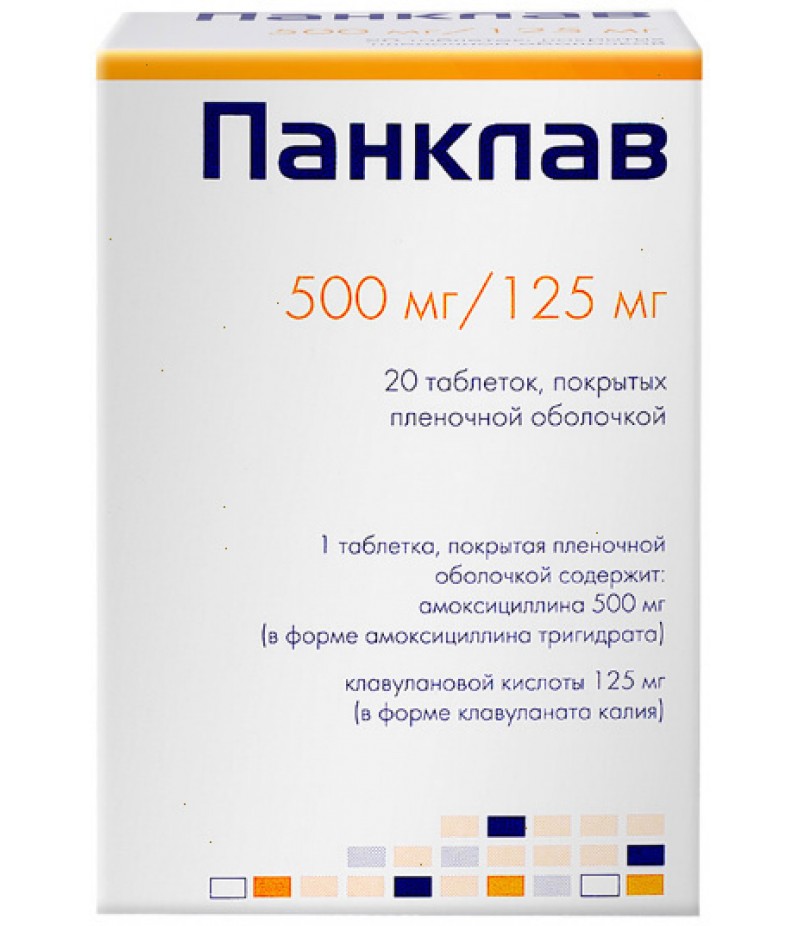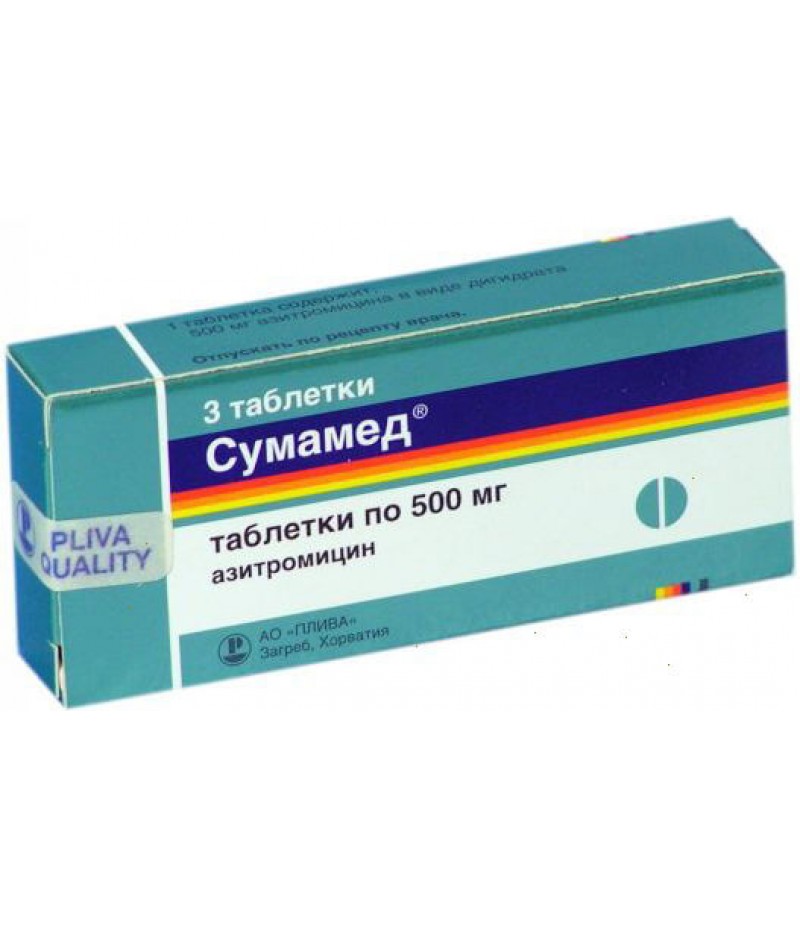Augmentin 875mg + 125mg #14
- $22.67
- 3 or more $21.90
- Availability:In Stock
User manual for AugmentinYou can buy Augmentin on this pageAugmentin is a complex medicinal product from a group of antibiotics of a wide range of effects, which includes amoxicillin and clavulanic acid.The main active substance o..
Tags: tabs
User manual for Augmentin
You can buy Augmentin on this page
Augmentin is a complex medicinal product from a group of antibiotics of a wide range of effects, which includes amoxicillin and clavulanic acid.
The main active substance of tablets is amoxicillin, it belongs to antibiotics of a wide spectrum of effects of semi-synthetic origin, which shows high therapeutic activity in relation to most of gram-positive and gram-negative microorganisms. Amoxicillin is destroyed by beta-lactamase, so a drug based on this active substance is not prescribed for the destruction of pathogenic microorganisms that produce beta-lactamases.
Clavulanic acid, which is a part of the tablets of this drug, is a compound of beta-lactams that is able to destroy or stop the action of beta-lactamases and other enzymes produced by pathogenic microorganisms, which in turn show resistance to the penicillin group of drugs and cephalosporins.
The clavulanic acid present in the tablet protects amoxicillin from the destructive destruction of beta-lactamases produced by microorganisms, thereby contributing to the expansion of the antibacterial properties of the drug. It is thanks to this component that Augmentin can be detrimental to pathogenic microorganisms that are highly resistant to the penicillin group of drugs and cephalosporins.
Which microorganisms are adversely affected by this drug?
Augmentin tablets are active against Gram-positive and Gram-negative aerobic and anaerobic pathogenic microorganisms, and the active substances of the drug are harmful to some other agents of serious infections.
The drug shows a wide activity in relation to chlamydia, pale treponema (the causative agent of syphilis), bacteria that causes the development of leptospirosis, escherichia coli, staphylococcus, streptococcus, klebsiels, listeria, bacilli, clostridia, brucella, vaginal gardrillam, salmonella, shigella, cholera vibrio and many others microorganisms.
Some of these strains of bacteria produce beta-lactamases, which leads to the resistance of these pathogens to the active substances of the drug.
Pharmacological properties
Tablets Augmentin is a long-acting drug that is significantly different from other substances based on amoxicillin. Due to this, the drug can be used to kill pathogens of pneumonia that are resistant to penicillins.
After ingestion, the active substances Augmentin - amoxicillin and clavulanic acid, rapidly dissolve and are absorbed in the gastrointestinal tract. The maximum therapeutic effect of the drug manifests itself in the event that the patient takes the pill before meals. The concentration of active substances of the drug is evenly distributed over internal organs and systems - the chest cavity, abdominal cavity, tissues, penetrates into bile, is found in sputum, purulent discharge, interstitial and intraarticular fluid.
Like most penicillins, amoxicillin is able to penetrate into breast milk. According to medical studies in breast milk, traces of clavulanic acid have also been detected. This drug, as a rule, is not prescribed for the treatment of lactating women because of the high risk of accumulation of the active substances of Augmentin in the liver of the infant that enter the body with the mother's milk.
The Augmentin drug was also subjected to laboratory studies in animals, during which it was found that clavulanic acid and amoxicillin easily penetrate the placental barrier into the uterus, but the studies did not reveal any mutagenic or destructive effects of these drugs on the fetus.
Amoxicillin is excreted from the patient's body naturally through the kidneys, and clavulanic acid through complicated renal and extrarenal mechanisms. Approximately 1/10 part of the initial dose of amoxicillin is excreted in the urine, while clavulanic acid undergoes metabolic processes and is partially excreted from the body with feces and urine.
When do they designate Augmentin?
The main indications for the appointment of the Augmentin tablets are:
diseases of the upper respiratory tract and nasopharynx of inflammatory and infectious origin - sinusitis, inflammation of the middle ear, inflammation of the pharyngeal tonsils, pharyngitis, bronchitis caused by pathogenic microorganisms sensitive to the drug components (streptococci, staphylococci);
Infectious and inflammatory diseases of the lower respiratory tract - recurrent chronic bronchitis, bronchopneumonia, inflammatory diseases of lung tissue;
Infectious diseases of the urogenital system caused by species of the bacterium enterobacteria, escherichia coli, staphylococcus saprophyticus, enterococci, gonococcus - inflammatory processes of the bladder, inflammatory and infectious processes of the ureters, inflammation of the renal tissue (interstitial nephritis, pyelonephritis), gonorrhea, chlamydia;
Pustular diseases of the skin - pyoderma, boils, carbuncles and other lesions;
Infectious processes of joints and bones - osteomyelitis caused by a family of staphylococci;
Complications after difficult birth or abortion - endometritis, salpingo-oophoritis and other diseases of the sexual system of women, resulting from the penetration of pathogenic agents into the body. Often, inflammatory diseases of the uterus and its appendages can develop as a result of unscrupulous diagnostic manipulations - hystoroscopy, uterine sounding, diagnostic curettage of the uterine cavity, artificial termination of pregnancy and so on.
One of the indications for the appointment of Augmentin tablets is also mixed abdominal infections as part of complex therapy with other drugs.
Form of the preparation
Augmentin is available in the form of tablets with a dosage of 250, 500 and 875 mg. The tablets are covered with a dense film coat of a whitish color with a slightly milky shade.
Method of administration and dosage
The course of treatment and dosage of Augmentin tablets is set strictly by the physician for each individual patient individually. It is important to remember that this drug is an antibiotic, so it, however, like other medicines, can not be taken arbitrarily and when desired! In addition, some diseases are caused by microorganisms that can not be influenced by the active substances of the tablets, for example, viruses or fungi.
The dosage of the drug is determined by a specialist depending on many factors: the age of the patient, his diagnosis, the presence of complications, the functioning of the kidneys and liver of the patient, body weight and accompanying pathologies.
In order to achieve maximum absorption of the drug and reduce the risk of side effects, Augmentin tablets are recommended to be taken at the beginning of the meal.
The minimum course of therapy with this medication is at least 5 days. Even if all the symptoms of the diseases have disappeared, and the patient feels good in no case, one can not independently stop the treatment without completing the course indicated by the doctor. The thing is that pathogens quickly adapt to medicinal products and if the patient arbitrarily interrupts the course of therapy, the clinical symptoms of the disease can return with renewed vigor. In this case, the same pathological pathogens will no longer be sensitive to the Augmentin tablets, and the physician will have to select something new and stronger. This in turn leads to a risk of developing severe side effects and liver damage.
If the patient is forced to take the drug for more than 10 days, then on the 11th day, blood tests should be done to assess its performance. After 2 weeks from the beginning of the use of this drug, you need to review the need for further treatment or decide whether to stop taking the tablets. It should also be understood that for each disease there is a course of treatment, for example, for treatment of uncomplicated inflammation of the middle ear, treatment is no more than 7 days for adults, while treatment of children under 2 years can be continued up to 10 days.
If necessary or complicated flow of inflammatory-infectious processes, patients are sometimes prescribed at first Augmentin in the form of injections, and after the disappearance of acute symptoms and improvement of general condition, it is possible to switch to oral administration of the drug, i.e. tablets.
Dosage of the drug for children
As a rule, the calculation of the daily dose of Augmentin tablets in pediatric practice depends on many factors: the body weight of the child, infection, the severity of the condition, the age of the patient, the presence of complications. Children weighing up to 40 kg dosage is calculated from the calculation of mg / 1 kg of body weight. The amount of mg of the drug is determined by the doctor strictly individually for each individual patient. Children weighing more than 40 kg, undergo treatment at "adult" dosages.
For the treatment of infectious processes of the skin and soft tissues, pharyngitis and chronic tonsillitis, the minimum dosage of Augmentin is sufficient. To treat infections such as sinusitis, inflammation of the middle ear, inflammatory processes of the upper and lower respiratory tract, cystitis, pyelonephritis and other inflammations of the urogenital organs, high dosages of the drug are necessary.
The drug Augmentin in the form of tablets is not used in pediatric practice for the treatment of patients younger than 2 years, as there is no accurate clinical data on the safety of such therapy.
Dosage of the Augmentin drug for adults and children over 14 years of age
Adults and children over 14 years of age or patients with a body weight of more than 40 kg are prescribed Augmentin at a rate of 1 tablet three times a day for the treatment of infections of mild and moderate severity. For the treatment of complicated or neglected infectious processes in adults and children over 14 years of age, usually other drug dosage forms are prescribed, more often injections.
Patients of retirement age who have severe impairment of kidney and liver function, the daily dose of the drug is adjusted by the attending physician.
Side effects
With the correct use of Augmentin tablets and accurately calculated dosages, the drug as a whole is normally tolerated by patients. In some cases, with individual hypersensitivity to the components of the drug, the following side effects may develop:
On the part of the organs of the digestive canal: nausea, pain in the stomach, bloating, flatulence, vomiting, diarrhea, impaired liver function, development of hepatitis;
From the side of urinary organs: acute renal failure, oliguria, impaired renal function;
From the central and peripheral nervous system: dizziness, convulsions, headaches, insomnia or, conversely, severe drowsiness, symptoms of intoxication of the body, which are expressed in increasing weakness, poor response of the patient to what is happening around.
The most common side effects include allergic skin rashes, hives, thrush (candidiasis of the vagina in women and mucous membranes of the mouth).
If the dosage prescribed by the doctor is strictly observed and if the drug is correctly administered, side effects from taking Augmentin develop only in the rarest of cases.
Contraindications for use
Despite a wide range of its effects, Augmentin tablets have a number of contraindications. These include:
Individual intolerance to penicillins, cephalosporins;
Hypersensitivity to auxiliary components of the drug;
Severe dysfunction of the liver and kidneys;
Children under 2 years;
Infectious mononucleosis - with the use of Augmentin tablets with this diagnosis, an allergic rash may appear on the patient's skin, which will make it difficult to adequately diagnose the pathology.
Use of the drug during pregnancy and breastfeeding
The drug Augmentin is tested in laboratories on animals. According to the data of numerous studies, the tablets of the preparation, even in high doses, did not exert mutagenic and teratogenic effects on the fetus of animals. Despite this, the use of the drug based on amoxicillin and clavulanic acid in pregnant women is contraindicated, especially in the first trimester of pregnancy. In the first 12 weeks, all the fetal organs and systems are laid, and taking any medications during this period can lead to gross chromosomal abnormalities and, as a result, anomalies in prenatal development. In addition, when scientists tested the drug in a woman who gave birth to a non-viable child prematurely, it was found that even preventive doses of Augmentinite significantly increase the risk of developing necrotic colitis in newborns.
According to the instructions for the drug, Augmentin during fetal gestation can be taken only in the most extreme cases and provided that the benefits for women far exceed the risk of developing possible side effects to the fetus.
The use of Augmentin during breastfeeding is possible, but only under strict indications and under the supervision of a physician. A breastfeeding woman should in no case exceed the dosage given by the doctor, since amoxicillin penetrates well into breast milk and at high concentrations can lead to a cumulative effect in the baby's liver, which is fraught with the development of side effects in the baby. In addition to this risk, no abnormal effects of Augmentin on the baby's body that receives breast milk have been identified in numerous studies.
special instructions
Before starting this medication, the patient should provide the doctor with a detailed history of his tolerance to the penicillin group and cephalosporins. In addition, it is necessary to indicate whether there have been any history of any allergic reactions to medications and their components.
In medicine, many cases of the development of serious allergic reactions of patients to drugs containing penicillins are described. In some cases, anaphylactic shock from the administration of the drug leads to a lethal outcome! The risk of developing such allergic reactions to penicillins or cephalosporins is particularly high in patients with a hereditary predisposition or people who have had negative symptoms in the past in response to the use of amoxicillin or other penicillin-based drugs. With a high risk of allergy to the drug, the doctor must choose an alternative treatment for the patient, which will also be effective but safe for the patient's body.
With the development of anaphylactic shock or Quincke's edema in response to the introduction or taking of Augmentin, the patient should immediately enter adrenaline, intravenous glucocorticosteroid hormones. If swelling is severe and the patient is choking, the airways must be immediately ventilated, this may require intubation of the trachea.
Augmentin tablets are used with particular caution for the treatment of elderly patients and patients with severe disorders in the functioning of the kidneys and liver.
To reduce the risk of side effects on the part of the digestive system from taking the drug, Augmentin tablets should be taken at the beginning of the meal.
After taking the tablets, patients with hypersensitivity to tooth enamel are advised to thoroughly brush their teeth to avoid the destruction or coloration of the enamel.
Patients who start taking drugs based on amoxicillin, are prone to increase prothrombin time. That is why, while treating Augmentin and anticoagulants simultaneously, patients should periodically take blood tests to track the reaction.
Patients with reduced daily diuresis (urination) are prone to the appearance of crystals in the urine in rare cases. As a rule, this symptom occurs mainly with parenteral administration of the drug. During therapy with amoxicillin-based drugs, a sufficient amount of pure water is recommended to prevent the formation of crystals of the drug in the urine.
Excessive treatment with Augmentin can lead to a rapid growth of insensitive to the components of the drug microorganisms. In the period of prolonged use of the drug, it is recommended to monitor the work of the kidneys, liver and hematopoiesis by means of urine and blood tests.
During the period of therapy with the drug Augmentin, it is forbidden to drink alcoholic beverages, since the interaction of alcohol and active substances of the drug can lead to toxic damage to the liver and central nervous system.
The Augmentin tablets do not adversely affect the reaction rate and do not affect the management of motor vehicles and other mechanisms.
Interaction of the drug with other drugs
Tablets Augmentin is not recommended to be taken concomitantly with Allopurinol because of the high risk of developing allergic reactions and side effects in the patient. If you are already taking Allopurinol, you should definitely inform the doctor about it.
During the period of use of Augmentin, as well as any other antibiotics of the penicillin group, the effectiveness of birth control pills may decrease, which should be known to women who prefer this type of protection from unwanted pregnancy.
Augmentin analogues
Analogues for the active substance: Amoxiclav, Flemoсlav Solutab.

